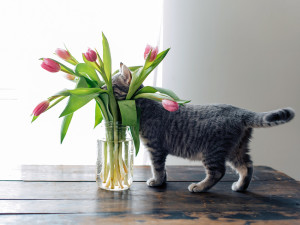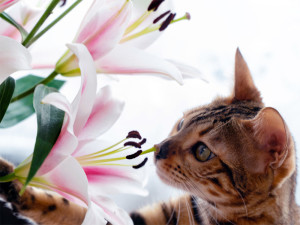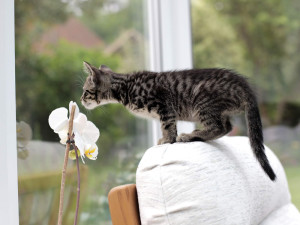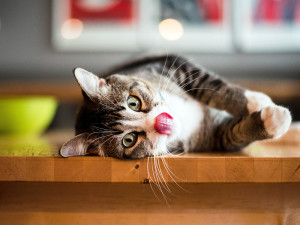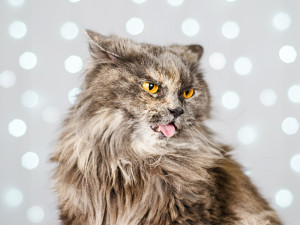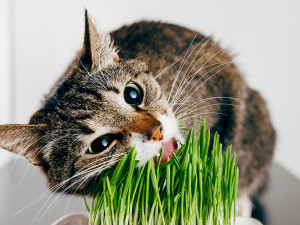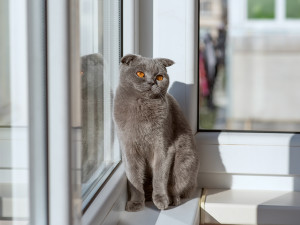Are Sunflowers Toxic to My Cat?
You’ve gotta love sunflower season—here’s why your cat can, too.
Sunflowers are a bright addition to any yard or garden, but do they present a danger to your cat? Unfortunately, some of the prettiest plants can be toxic or even deadly to felines, but sunflowers are a cat-safe delight. However, it’s a good idea to keep your cat from eating these plants, both for your garden’s beauty and your cat’s comfort.
Learn all about the potential dangers of plant poisoning and how sunflowers could upset your cat’s health.
Why are sunflowers dangerous to cats?
Eating sunflowers could result in digestive upset for your cat, but in most cases this symptom will ease on its own. The bigger concern is your cat consuming sunflower seed shells. These rough shells could irritate the digestive tract and even result in a blockage that may require surgery to remove.
What should I do if my cat has eaten sunflowers?
Keep an eye on your cat if they’ve ingested sunflowers but don’t rush to the vet. Cats have difficulty digesting raw plant materials, so your cat may experience vomiting or diarrhea. Unless you notice severe side effects, your cat will likely be just fine once their stomach upset passes.
How much do you spend on your pet per year?
Diagnosing plant poisoning in cats
If you think your cat has eaten a hazardous plant, visit your vet or an emergency vet clinic immediately. Bring a sample of the plant with you so the vet knows exactly what your cat consumed and be prepared to list any symptoms. Your vet will then recommend a treatment plan, which may involve inducing vomiting.
Symptoms of plant poisoning in cats
While sunflowers may be non-toxic to cats, other plants could cause poisoning. Look out for these symptoms if you think your cat may have ingested a hazardous plant:
Loss of appetite
Diarrhea
Drooling
Tremors or seizures
Difficulty breathing
Weight loss
Treatment
The treatment plan for a cat suffering from plant poisoning will depend on their specific symptoms and how severe those symptoms are. Some plants are only mildly toxic to cats, while others can cause serious health issues if not treated immediately. In most cases, sunflower ingestion will only give your cat an upset stomach, which will usually go away on its own.
How to prevent plant poisoning
Place any hazardous plants outside of the house in a garden or in a room with a door that can be closed. Make sure your garden area outside is blocked off from your cat or, better yet, don’t allow your cat outdoors unsupervised. You can also keep plants on a high shelf, as long as your cat is unable to reach it.
Are all parts of sunflowers safe for cats?
All parts of sunflowers are safe and non-toxic for cats to consume. However, the seeds could be a choking hazard, since cats don’t chew their food well.
How do I stop my cat from eating sunflowers?
The best way to prevent your cat from eating sunflowers — or anything you don’t want them to eat — is to keep the plant out of their reach. Place sunflowers in a room with a door you can close or in an area of the home your cat can’t access.
The bottom line: Are sunflowers poisonous for my cat?
All parts of a sunflower are non-toxic to cats, even the seeds, but if your cat ingests too much of the plant, they could end up with an upset stomach. And while sunflower seeds aren’t poisonous to cats, their small size could present a choking hazard.
Other plants that are safe for cats
Fortunately, sunflowers aren’t the only plants that are safe for cats. There are multiple plants you can safely keep in your home with your cat:
Roses
Orchids
Zinnias
Asters
African Violets
Other plants that are dangerous for cats
Many plants are much more dangerous — or even deadly — to cats than sunflowers, including:
Lilies
Azaleas
Tulips
Daffodils
Mums
If your cat consumes a toxic plant, visit your veterinarian or an emergency vet clinic immediately. You can also call the Pet Poison Helpline at 855-764-7661 or the ASPCA Animal Poison Control Centeropens in new tab at 888-426-4435 to determine if your dog needs immediate attention.
FAQs (People also ask)
What happens if cats eat sunflowers?
If a cat eats too much sunflower, they will likely only experience an upset stomach. To keep your cat comfortable and healthy, keep sunflowers and other plants out of their reach.
How much sunflower is toxic to cats?
Sunflowers are not toxic to cats, but you should still try to keep your cat from eating all parts of the flower.
Are sunflowers poisonous to cats if they smell them?
No, your cat can safely enjoy the scent of sunflowers, just like you!




